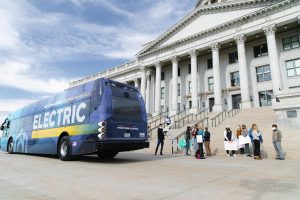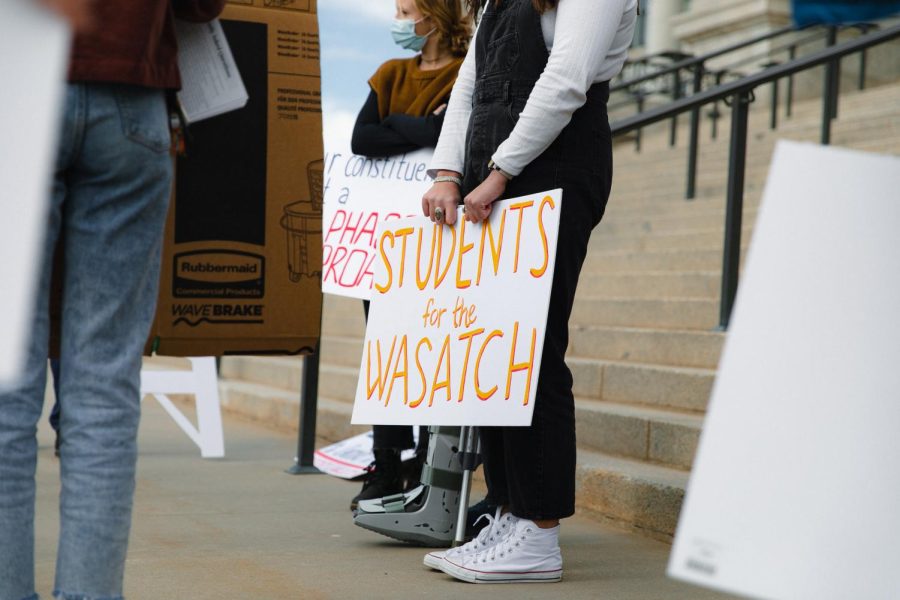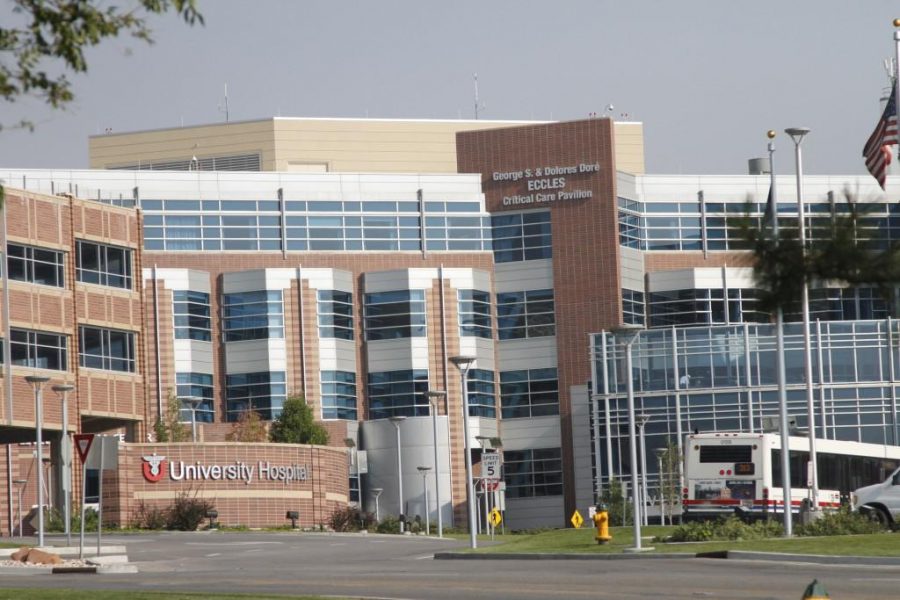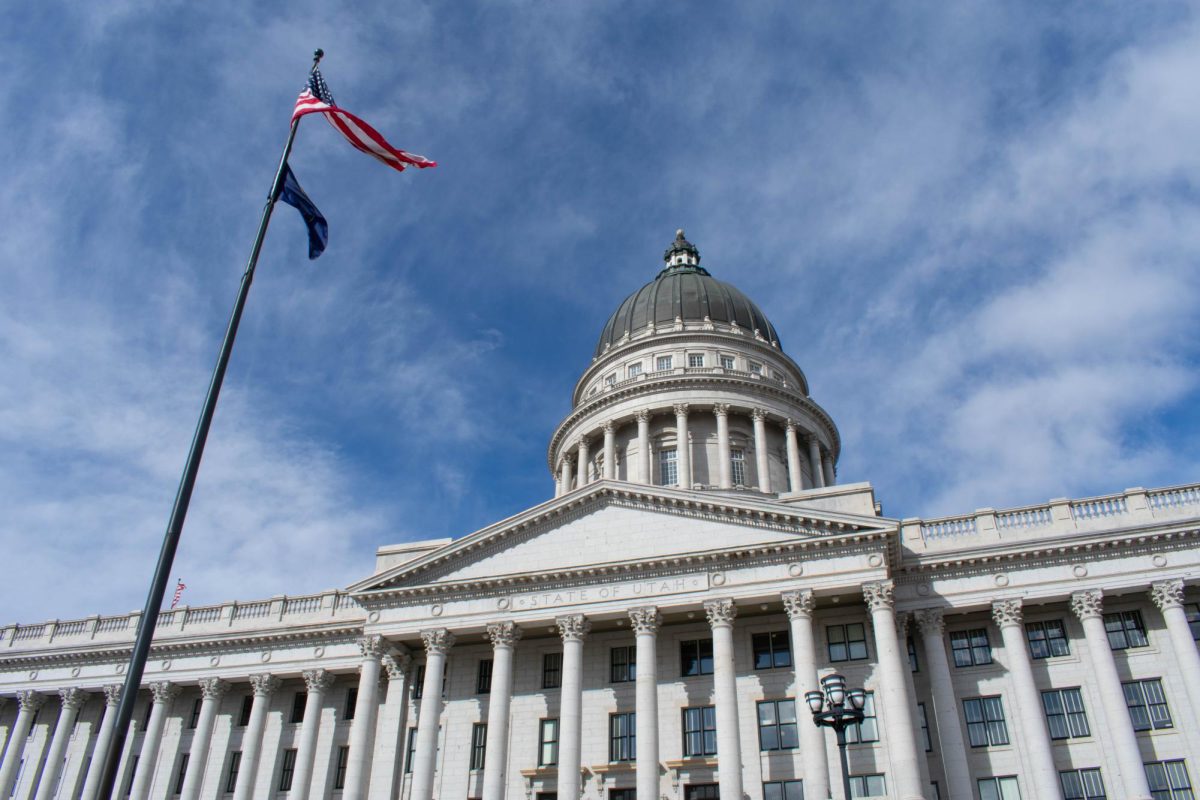Student-Led Group Advocates for ‘Common Sense’ Solutions to Little Cottonwood Traffic Issues
A sign brought by University of Utah students in favor of better solutions for Little Cottonwood canyon at the Capitol building in Salt Lake City on Wednesday, Feb. 9, 2022. (Photo by Rachel Rydalch | The Daily Utah Chronicle)
February 13, 2022
At the steps of the Utah State Capitol, University of Utah students and Salt Lake Valley residents gathered next to a blue electric bus advocating against the proposed gondola in Little Cottonwood Canyon on Wednesday, Feb. 9.
Students for the Wasatch, a student-led group, organized the event to promote public transportation in the canyon and surrounding areas.
“We really want to stress that public transit can be a useful solution,” said Mallory Philliber, secretary of Students for the Wasatch and senior at the U.
To demonstrate the usefulness of public transit, organizers teamed with Proterra, an electric vehicle manufacturer, to ride one of their electric buses from the U to the Capitol. They later continued their ride to Alta to show electric buses can drive through the canyon.
The Utah Department of Transportation released two proposals last June addressing transportation concerns within Little Cottonwood Canyon. The proposals came after UDOT conducted a three-year environmental impact study.
One proposal would build a gondola in the canyon to transport canyon visitors to Alta and Snowbird. The second proposal would add a bus lane to increase bus services through the canyon and requires expanding the road.
Attendees at the event seized the opportunity to talk to legislators walking out of the Capitol and urge them to oppose the gondola proposal.

Gay Bennion, a Utah House Representative, expressed her support for the student organization adding many of her constituents in Cottonwood Heights also oppose the gondola.
“As I hike and enjoy beautiful Little Cottonwood Canyon, I cannot imagine what it would look like to have a gondola up in that canyon,” Bennion said.
A gondola is an enclosed chairlift type transportation that run parallel to the highway, it would be an alternative to driving up the canyon.
“I support a fiscally responsible phased approach … and things like clean electric buses,” said Suzanne Harrison, a Utah House Representative for Sandy.
Harrison added parking reservations and carpooling are also a part of the solutions to help citizens enjoy the canyons without “footing taxpayers with a huge bill.”
Emily Pitsch, co-president of Students for the Wasatch and a Ph.D. student at the U, said their organization advocates for “common sense solutions and a phased approach.”
Pitsch said they believe in starting with smaller solutions such as improving bus services and implementing tolling. Pitsch said their ultimate goal is to stop the gondola.
“A public transit system could be implemented immediately, rather than waiting five years for construction to finish,” Philliber said.
Philliber said increasing park and rides throughout the valley would also help decrease traffic near the canyon and would help Big Cottonwood Canyon and Parley’s Canyon.

According to Pitsch, Students for the Wasatch also oppose widening the canyon road because of the environmental impact.
The impact on the watershed and financial burden on taxpayers are some additional issues with the UDOT proposal, said Sydney Smith, a freshman at the U and member of Students for the Wasatch.
Smith added there is a concern for potential fees to use the gondola, which would benefit private organizations instead of helping the Utah population as a whole.
The gondola proposal would cost $592 million, while the UDOT proposal on widening the road and expanding bus services would cost $510 million. Taxpayers would likely be footing the bill.
Many attendees at the Capitol echoed these concerns, including members of Friends of Little Cottonwood Canyon and Friends of Alta.
Whitney Wilkinson of Friends of Little Cottonwood Canyon said she wants common-sense solutions and a phased approach and to “preserve the canyon for future generations.”
Sage Nightingale, a junior studying biology and environmental studies at the U, said the gondola proposal only addresses Little Cottonwood Canyon while Big Cottonwood Canyon has similar issues. He also expressed concern about the cost and how the gondola and road expansion would impact climbing and hiking areas near the road.
Sofi Thoms, a sophomore at the U studying environmental and sustainability studies, said she’s worried about the gondola polluting the watershed which supplies water to the Salt Lake Valley.
She added she believes the gondola won’t ease traffic issues since people will still drive to the gondola, which will continue to contribute to valley air pollution.












